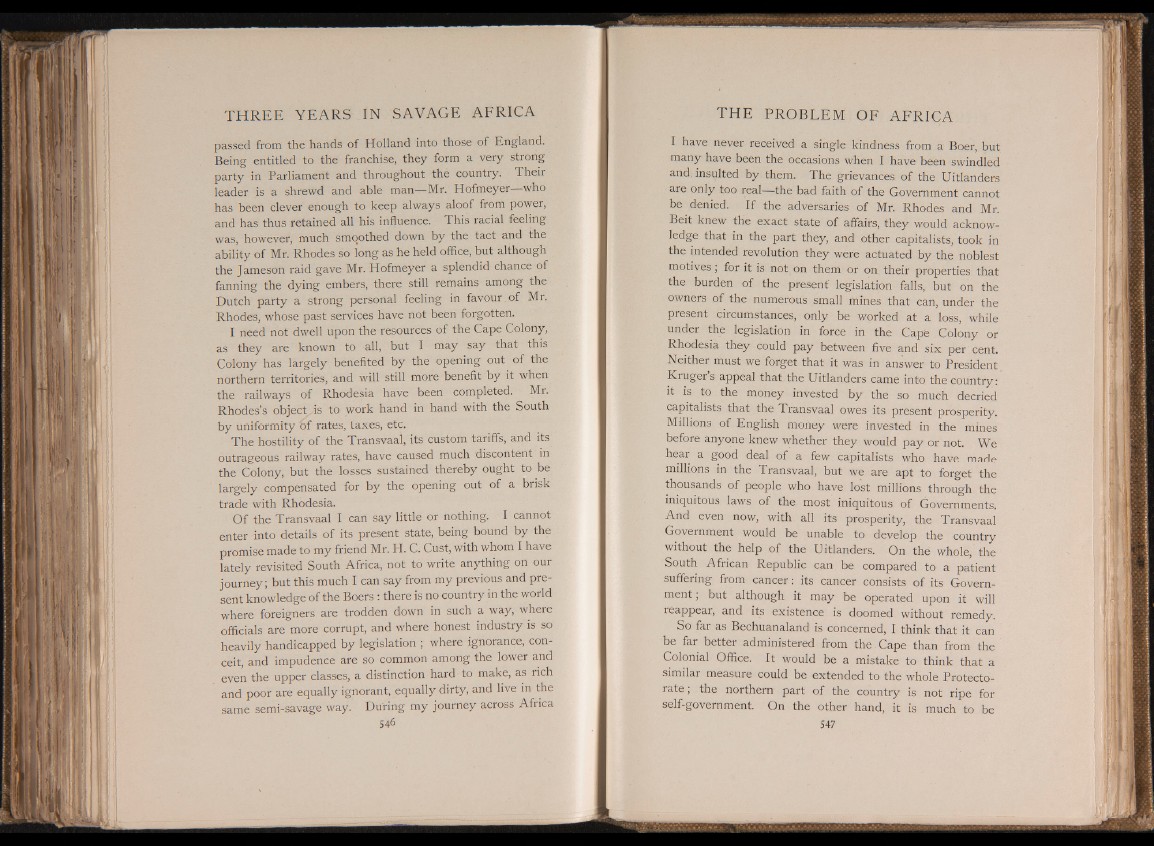
passed from the hands of Holland into those of England.
Being entitled to the franchise, they form a very strong
party in Parliament and throughout the country. Their
leader is a shrewd and able man—Mr. Hofmeyer—who
has been clever enough to keep always aloof from power,
and has thus retained all his influence. This racial feeling
was, however, much smoothed down by the tact and the
ability of Mr. Rhodes so long as he held office, but although
the Jameson raid gave Mr. Hofmeyer a splendid chance of
fanning the dying embers, there still remains among the
Dutch party a strong personal feeling in favour of Mr.
Rhodes, whose past services have not been forgotten.
I need not dwell upon the resources of the Cape Colony,
as they are known to all, but I may say that this
Colony has largely benefited by the opening out of the
northern territories, and will still more benefit by it when
the railways of Rhodesia have been completed. Mr.
Rhodes’s object is to work hand in hand with the South
by uniformity of rates, taxes, etc.
The hostility of the Transvaal, its custom tariffs, and its
outrageous railway rates, have caused much discontent in
the Colony, but the losses sustained thereby ought to be
largely compensated for by the opening out of a brisk
trade with Rhodesia.
Of the Transvaal I can say little or nothing. I cannot
enter into details of its present state, being bound by the
promise made to my friend Mr. H. C. Cust, with whom I have
lately revisited South Africa, not to write anything on our
journey; but this much I can say from my previous and present
knowledge of the Boers : there is no country in the world
where foreigners are trodden down in such a way, where
officials are more corrupt, and where honest industry is so
heavily handicapped by legislation ; where ignorance, conceit,
and impudence are so common among the lower and
even the upper classes, a distinction hard to make, as rich
and poor are equally ignorant, equally dirty, and live in the
same semi-savage way. During my journey across Africa
546
I have never received a single kindness from a Boer, but
many have been the occasions when I have been swindled
and, insulted by them. The grievances of the Uitlanders
are only too real—the bad faith of the Government cannot
be denied. If the adversaries of Mr. Rhodes and Mr.
Beit knew the exact state of affairs, they would acknowledge
that in the part they, and other capitalists, took in
the intended revolution they were actuated by the noblest
motives ; for it is not on them or on their properties that
the burden of the present' legislation falls, but on the
owners of the numerous small mines that can, under the
present circumstances, only be worked at a loss, while
under the legislation in force in the Cape Colony or
Rhodesia they could pay between five and six per cent.
Neither must we forget that it was in answer to President
Krugers appeal that the Uitlanders came into the country:
it is to the money invested by the so much decried
capitalists that the Transvaal owes its present prosperity.
Millions of English money were invested in the mines
before anyone knew whether they would pay or not. We
hear a good deal of a few capitalists who have made
millions in the Transvaal, but we are apt to forget the
thousands of people who have lost millions through the
iniquitous laws of the most iniquitous of Governments.
And even now, with all its prosperity, the Transvaal
Government would be unable to develop the country
without the help of the Uitlanders. On thé whole, the
South African Republic can be compared to a patient
suffering from cancer : its cancer consists of its Government
; but although it may be operated upon it will
reappear, and its existence is doomed without remedy.
So far as Bechuanaland is concerned, I think that it can
be far better administered from the Cape than from the
Colonial Office. It Would be a mistake to think that a
similar measure could be extended to the whole Protectorate
; the northern part of the country is not ripe for
self-government. On the other hand, it is much to be
547